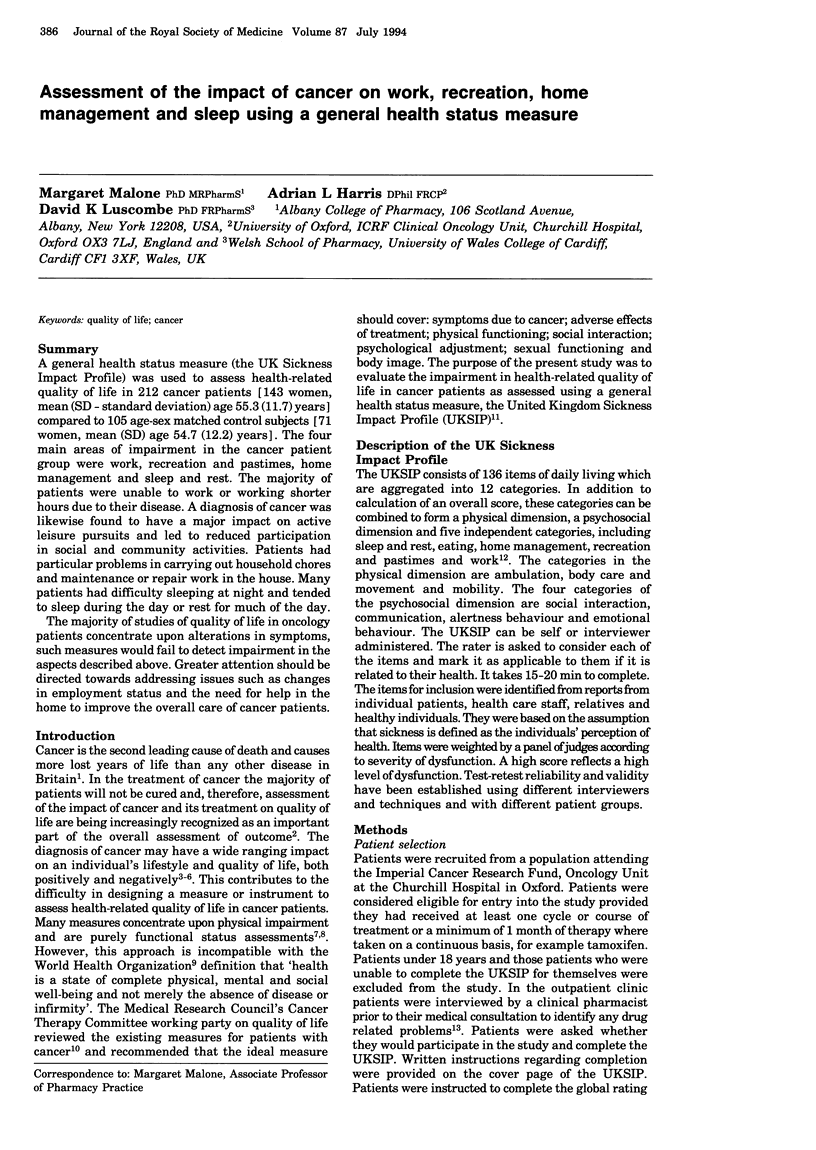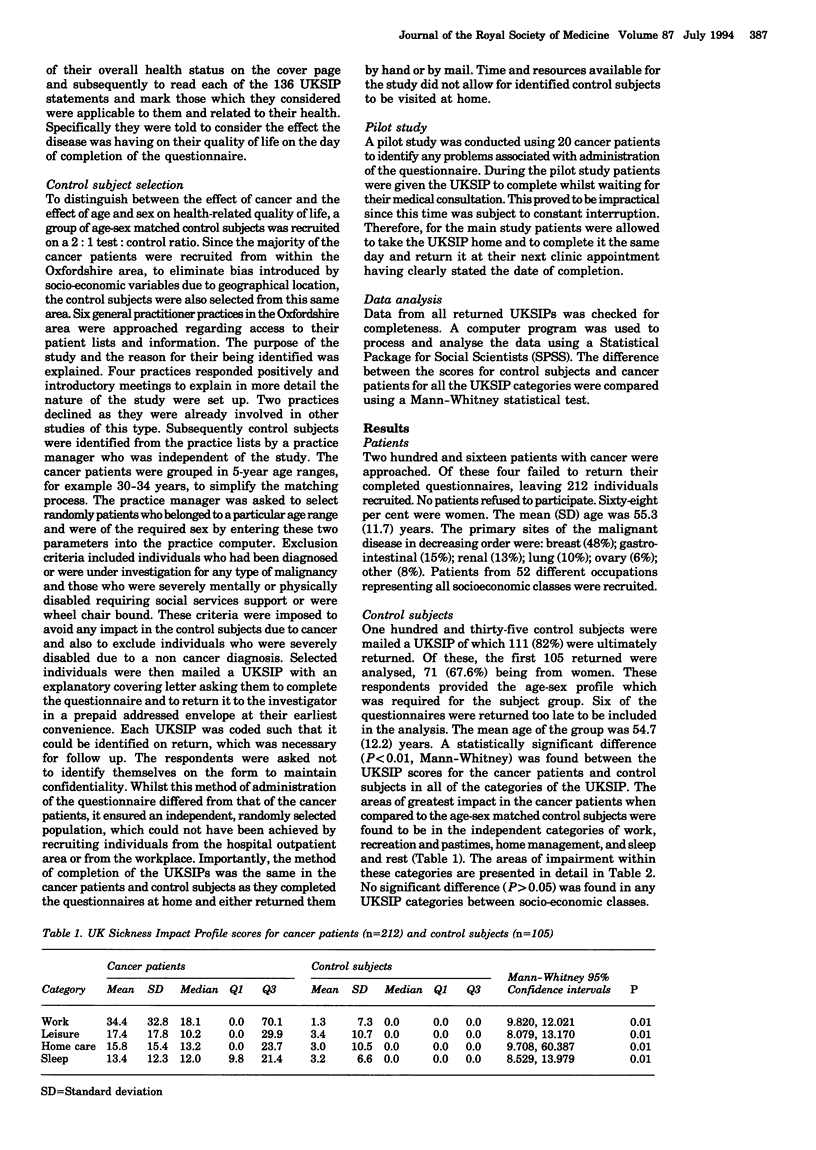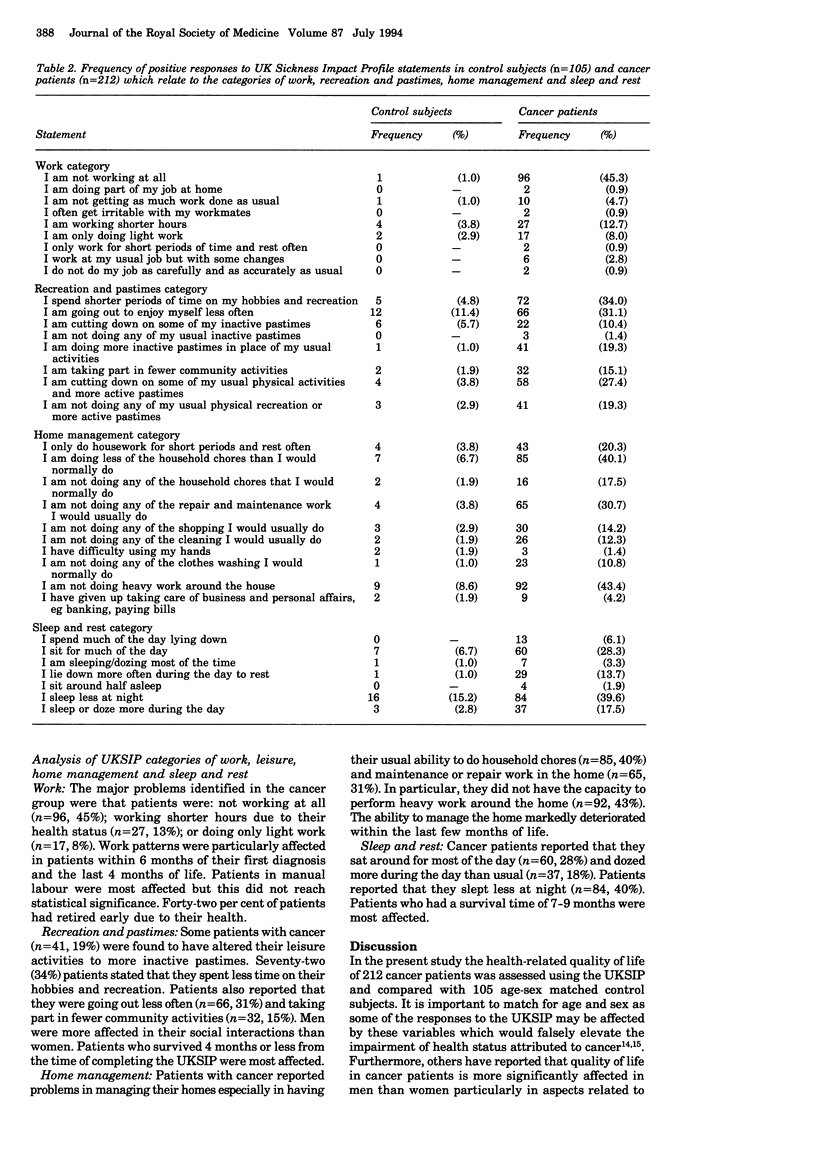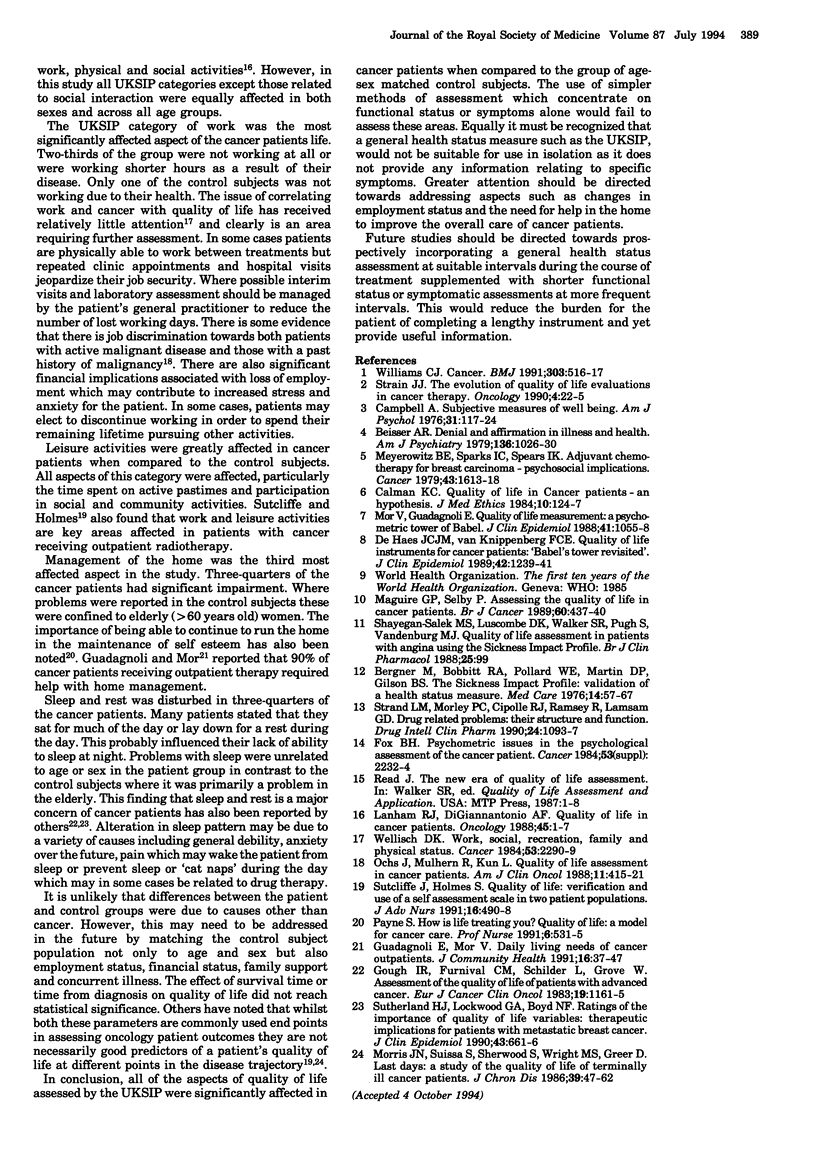Abstract
A general health status measure (the UK Sickness Impact Profile) was used to assess health-related quality of life in 212 cancer patients [143 women, mean (SD-standard deviation) age 55.3 (11.7) years] compared to 105 age-sex matched control subjects [71 women, mean (SD) age 54.7 (12.2) years]. The four main areas of impairment in the cancer patient group were work, recreation and pastimes, home management and sleep and rest. The majority of patients were unable to work or working shorter hours due to their disease. A diagnosis of cancer was likewise found to have a major impact on active leisure pursuits and led to reduced participation in social and community activities. Patients had particular problems in carrying out household chores and maintenance or repair work in the house. Many patients had difficulty sleeping at night and tended to sleep during the day or rest for much of the day. The majority of studies of quality of life in oncology patients concentrate upon alterations in symptoms, such measures would fail to detect impairment in the aspects described above. Greater attention should be directed towards addressing issues such as changes in employment status and the need for help in the home to improve the overall care of cancer patients.
Full text
PDF



Selected References
These references are in PubMed. This may not be the complete list of references from this article.
- Beisser A. R. Denial and affirmation in illness and health. Am J Psychiatry. 1979 Aug;136(8):1026–1030. doi: 10.1176/ajp.136.8.1026. [DOI] [PubMed] [Google Scholar]
- Bergner M., Bobbitt R. A., Pollard W. E., Martin D. P., Gilson B. S. The sickness impact profile: validation of a health status measure. Med Care. 1976 Jan;14(1):57–67. doi: 10.1097/00005650-197601000-00006. [DOI] [PubMed] [Google Scholar]
- Calman K. C. Quality of life in cancer patients--an hypothesis. J Med Ethics. 1984 Sep;10(3):124–127. doi: 10.1136/jme.10.3.124. [DOI] [PMC free article] [PubMed] [Google Scholar]
- Campbell A. Subjective measures of well-being. Am Psychol. 1976 Feb;31(2):117–124. doi: 10.1037//0003-066x.31.2.117. [DOI] [PubMed] [Google Scholar]
- Gough I. R., Furnival C. M., Schilder L., Grove W. Assessment of the quality of life of patients with advanced cancer. Eur J Cancer Clin Oncol. 1983 Aug;19(8):1161–1165. doi: 10.1016/0277-5379(83)90042-1. [DOI] [PubMed] [Google Scholar]
- Guadagnoli E., Mor V. Daily living needs of cancer outpatients. J Community Health. 1991 Feb;16(1):37–47. doi: 10.1007/BF01340467. [DOI] [PubMed] [Google Scholar]
- Lanham R. J., DiGiannantonio A. F. Quality-of-life of cancer patients. Oncology. 1988;45(1):1–7. doi: 10.1159/000226519. [DOI] [PubMed] [Google Scholar]
- Maguire P., Selby P. Assessing quality of life in cancer patients. Br J Cancer. 1989 Sep;60(3):437–440. doi: 10.1038/bjc.1989.301. [DOI] [PMC free article] [PubMed] [Google Scholar]
- Meyerowitz B. E., Sparks F. C., Spears I. K. Adjuvant chemotherapy for breast carcinoma: psychosocial implications. Cancer. 1979 May;43(5):1613–1618. doi: 10.1002/1097-0142(197905)43:5<1613::aid-cncr2820430508>3.0.co;2-8. [DOI] [PubMed] [Google Scholar]
- Mor V., Guadagnoli E. Quality of life measurement: a psychometric tower of Babel. J Clin Epidemiol. 1988;41(11):1055–1058. doi: 10.1016/0895-4356(88)90074-1. [DOI] [PubMed] [Google Scholar]
- Morris J. N., Suissa S., Sherwood S., Wright S. M., Greer D. Last days: a study of the quality of life of terminally ill cancer patients. J Chronic Dis. 1986;39(1):47–62. doi: 10.1016/0021-9681(86)90106-2. [DOI] [PubMed] [Google Scholar]
- Ochs J., Mulhern R., Kun L. Quality-of-life assessment in cancer patients. Am J Clin Oncol. 1988 Jun;11(3):415–421. doi: 10.1097/00000421-198806000-00019. [DOI] [PubMed] [Google Scholar]
- Payne S. How is life treating you? Quality of life: a model for cancer care. Prof Nurse. 1991 Jun;6(9):531–535. [PubMed] [Google Scholar]
- Strain J. J. The evolution of quality of life evaluations in cancer therapy. Oncology (Williston Park) 1990 May;4(5):22–27. [PubMed] [Google Scholar]
- Strand L. M., Morley P. C., Cipolle R. J., Ramsey R., Lamsam G. D. Drug-related problems: their structure and function. DICP. 1990 Nov;24(11):1093–1097. doi: 10.1177/106002809002401114. [DOI] [PubMed] [Google Scholar]
- Sutcliffe J., Holmes S. Quality of life: verification and use of a self-assessment scale in two patient populations. J Adv Nurs. 1991 Apr;16(4):490–498. doi: 10.1111/j.1365-2648.1991.tb03440.x. [DOI] [PubMed] [Google Scholar]
- Sutherland H. J., Lockwood G. A., Boyd N. F. Ratings of the importance of quality of life variables: therapeutic implications for patients with metastatic breast cancer. J Clin Epidemiol. 1990;43(7):661–666. doi: 10.1016/0895-4356(90)90036-o. [DOI] [PubMed] [Google Scholar]
- Wellisch D. K. Methodology in behavioral and psychosocial cancer research. Work, social, recreation, family, and physical status. Cancer. 1984 May 15;53(10 Suppl):2290–2302. doi: 10.1002/cncr.1984.53.s10.2290. [DOI] [PubMed] [Google Scholar]
- Williams C. J. Cancer. BMJ. 1991 Aug 31;303(6801):516–517. doi: 10.1136/bmj.303.6801.516. [DOI] [PMC free article] [PubMed] [Google Scholar]
- de Haes J. C., van Knippenberg F. C. Quality of life instruments for cancer patients: "Babel's Tower revisited". J Clin Epidemiol. 1989;42(12):1239–1241. doi: 10.1016/0895-4356(89)90123-6. [DOI] [PubMed] [Google Scholar]


